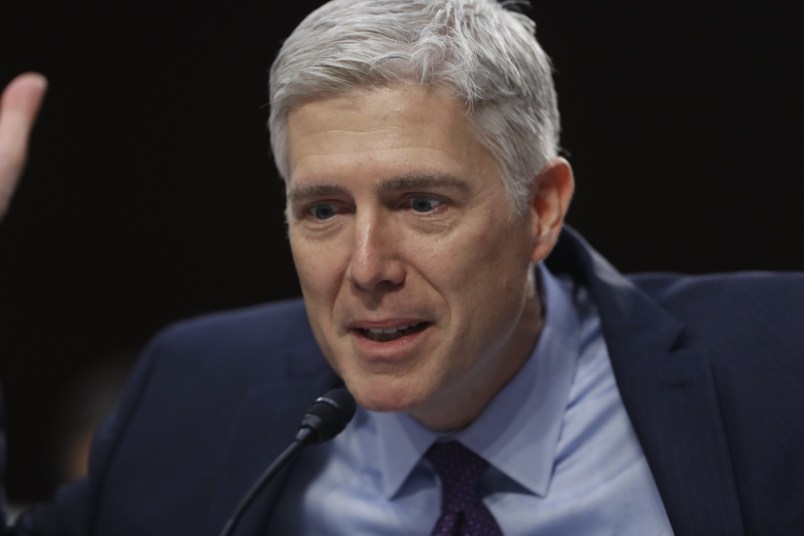In a tense exchange, Sen. Sheldon Whitehouse (D-RI) prodded Supreme Court nominee Neil Gorsuch about the role of outside money in a campaign supporting his nomination and, more generally, about his views on dark money in politics.
Whitehouse pointed to an outside dark money group that spent $7 million lobbying for the blockade of Merrick Garland’s nomination by President Obama and that was now spending $10 million to support Gorsuch.
“That’s a $17 million delta and for the life of me I’m trying to figure out what they see in you that makes that $17 million delta worth their spending,” Whitehouse said. “Do you have any answer to that?”
“You’d have to ask them,” Gorsuch deflected.
“I can’t. Because I don’t know who they are. It’s just a front group,” Whitehouse responded.
Earlier in the exchange, Whitehouse asked Gorsuch whether be believed there was a public interest in the disclosure of political funds in democracy.
“I recognize that as a matter of First Amendment interests, the Supreme Court has validated the proposition that disclosure serves important functions in a democracy,” Gorsuch said. “At the same time, the Supreme Court’s also acknowledged that those disclosure functions can sometimes themselves have unintended consequences as with the NAACP case [the Supreme Court’s 1955 decision NAACP v. Alabama], which I know you’re familiar with, where you can use disclosure as a weapon to try and silence people.”
Whitehouse then turned the conversation more sharply to the $10 million being spent in an outside campaign supporting Gorsuch’s nomination. He asked whether the donors behind that campaign should be more transparent.
Gorsuch brushed it off as a “politics question” and said that he was not “going to get involved in politics.” He argued it was up to the legislative branch to pass disclosure laws “that can be tested in the courts.”
“So Senator, with all respect, the ball’s in your court,” Gorsuch said.
Whitehouse questioned the idea that the Supreme Court stayed out of politics, pointing to the Citizen’s United decision that he said changed the landscape of politics. But Gorsuch continued to resist Whitehouse’s questions urging him to make a “values determination” on the lack of disclosure around money and politics, since the judge had acknowledged the First Amendment implications of disclosure cases.
“The First Amendment, which I’m sworn to uphold, as a judge, contains two competing messages here,” Gorsuch shot back. “It is regularly recognized the rights of this body to legislate in this area if it wishes to do so. If it hasn’t done so, with respect, that’s not — that’s not my fault. Okay? It’s on legislators to legislate.”
At one point in the back-and-forth, Whitehouse asked Gorsuch if he was concerned that there wasn’t much information out there about who was behind the $10 million campaign supporting his confirmation.
“Senator, there is a lot about the confirmation process today that I regret. A lot. A lot,” Gorsuch said. “When [Supreme Court Justice] Byron White sat here, it was 90 minutes. He was through this body in two weeks and he smoked cigarettes while he gave his testimony. There’s a great deal through it process that I regret. I regret putting my family through this.”











Then you never should have signed up for this you whining, wanker, Judge Titty-baby. Did nasty, old mean Sen. Whitehouse make little Master Gorsuch cry?
To paraphrase: “They’ve already established what Gorsuch is; now they’re just haggling over the price.”
I’m late to this, but has Cruz always been moderating this session?
Playing the race card. Nice.
I’m surprised at badly he’s losing his cool. The complaint about the length of his confirmation hearing, the smugness; this guy is a Scalia, all right – late-stage Scalia.
@inversion Cruz is man-crushing so hard even Gorsuch is creeped out.